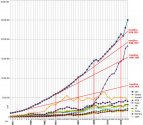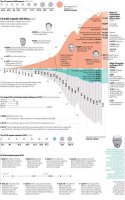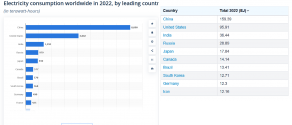I have to laugh at these triumphalist comments. That's all I have left to do.If the West want to escalate it's all find by me, Alaska and Great Britain are looking real nice as locations to settle once the US has been partitioned and NATO dissolved.
You're both making an error in assessing the sheer complexity and fragility of the dynamic system that current world economy and security architecture constitute.
There is no direct historical precedent to what's happening between US and China so we have to think in metaphors. I suggest Britain vs Germany in early 20th century.
- China is Germany - an industrial power with limited access to strategic resources, which depends on political cooperation from partners to sustain the access. China also intends to expand its market base just as Germany planned political expansion into Russia with the help of their Mitteleuropa strategy. For Germany the existential threat was blockading Germany to prevent them from using their economy to full extent.
- America is Britain - an industrial power with greater access to strategic resources which depends on control of sea lanes of communication. America has already established a market base and wants to defend it against competitors. For Britain the consolidation of German control over Europe was an existential threat because it disrupted maritime transit routes that Britain depended on.
Except that the direct conflict between Germany and Britain occurred across the North Sea and the English Channel. The direct conflict between China and America occurs across the Pacific which is half of the globe.
If China was to project power over Japan - a strategic ally and geopolitical asset, think Belgium in pre-WW1 model - it won't be comparable to what happened in WW1. While Germany could simply walk across the border into Belgium Britain could reliably maintain supply routes for its forces there. In comparison maintaining supply lines from America to Japan for any large-scale conflict is extremely difficult in purely logistical terms, even without the additional threat from Chinese military. WW2 doesn't apply there because in WW2 a decisive industrial advantage, as well as access to oil, was with the US. Japan had a significantly smaller industrial base and relied on captured territory for oil which could be disrupted by US navy. In US-China conflict the industrial advantage will be with China and due to geography energy won't be a significant problem, while no matter how much energy US has at its disposal it has to carry it to Japan.
If you look at Europe today then unless the US-China conflict takes place in Russia Europe will play the role of the US, except with no energy source of its own and with a demographic threat from the south that the US didn't have to deal with because the populations of Central and South America were smaller.
But for China the situation is not as advantageous as you may think.
This is the nominal GDP (USD) from dissolution of Bretton Woods to today. Note how anomalous the GDP growth for US and China is compared to the rest of the countries.

I only included the main European economies because I prepared this for a different argument, but it will largely hold even when you include other fast developing economies. From large countries only Bangladesh has a comparable proportional growth but at a much smaller scale, so it's not unexpected.
So what does the graph tell us? It demonstrates that current Chinese economy is in as much an inflationary bubble as the US and disruption to global trade will affect both to the same nominal extent.
It doesn't matter that China grows thanks to a trade surplus with the US because that trade surplus is financed by US borrowing from the future against no collateral - for example via a constant (since 2001) budget deficit which constitutes the most direct evidence of money creation that inflates American GDP.

China is producing goods paid for by money that don't have any backing in goods or services that add real value. In terms of how business cycle occurs there is no difference where the production takes place, only if it's sustainable in economic terms. If you borrow from the future - overtly by debt, or covertly by inflation - you can never calculate correctly the amount to be borrowed because you lack natural mechanism for limiting your expenditures - resource scarcity. Inevitably you borrow too much because your behavioural programming hasn't evolved for this type of thinking.
And that means that China's growth is not sustainable because it feeds of American growth which is not sustainable.
There are some differences that will affect how the fallout of the crash would unfold and I don't know enough about China's economic system to predict with any certainty so I will just outline the fundamental principles.
China is artificially lowering the value of the Yuan and keeps the domestic and international markets separated - i.e. keeps Chinese people poorer than those who are involved in international trade - which means that any crash will not affect domestic consumers to the same extent as in the US. It will however affect the international traders massively and if they managed to establish an oligarchical dynamic within China, then it will push China on the wrong path very quickly.
China is also still investing in capital goods and infrastructure while the US has long ago moved to a consumption-based model. This means that while GDP numbers may be high Chinese people don't have as much capital on their hands directly and their personal standard of living won't be as affected while investment in such sectors can be easily stimulated by public expenditure. Japan has stimulated its economy in the 90s this way and while Japan had nowhere to go with it, China may hope for a realignment of global economy in a 10-20 year period so it may be a viable way out.
China also has nominally a socialist system in place so in case of crisis socialist measures can be imposed for social control. This solution doesn't exist in the US, especially with the most radical capitalist/oligarchical faction returning to power soon. Popular dissent and disorder will be far more destructive there, especially due to firearm ownership.
However if this coupled system is disrupted China will still hurt a lot and far more than Europe for example. Europe's nightmare scenario is energy price spike - just what we've seen in 2022. As long as energy prices are affordable we can adjust our economy to most shortages. A disruption of trade with China would be an incentive to realign production methods and supply chains as long as energy is available. And here is the interesting twist: what happens with energy prices when USD collapses? They become very affordable as long as energy comes from the US which will need all the hard exports to shore up the collapsing currency - which will be also into the interest of EU. US is already selling energy to Europe. If they fight a war against China they will sell more and cheaper to fund it. Which is why US is happy with EU-Russia conflict being frozen, it's leverage and insurance.
So while the entire world will feel the disruption just like during the pandemic the poorer countries will be affected proportionally more, while the most affected economies will be US and China as well as Japan and Korea since they will be in theater.
And that is why China is unlikely to seek an overt conflict with the US but will instead insist on a long-term slow and mostly peaceful transition of power and influence which is inevitable at this point. The only country that has a (misguided) incentive to start a war is America, because it does benefit a specific group of people in America. Political power is a parasitic relationship so as long as those in power benefit the rest may suffer. Just like Putin and his clique ran Russian economy into the ground to protect his own power there are people in America that may choose that route instead of doing what would benefit most in the country, but required sacrifice from the few.
But to argue that China can simply walk through a global economic crisis unscathed because it produces a lot of goods demonstrates ignorance of fundamentals of economics.
This strategy mirrors the failed "king cotton" approach of the Confederacy in the American Secession War. The world will adapt and China will lose its advantage forever, apart from the few industries that rely on resources.
China has an extremely sefish economic policy that hurts the world to the same extent as what America does so most developing countries of the world will rejoice at any disruption to trade with China. That will be their chance and they will not waste it.
And as always with Taiwan - shameless plugs of my pet idea of how AR can be resolved quickly and with minimal loss of life:
PLA Strategy in a Taiwan Contingency
Singapore is not in a position to disallow anything. If there's a conflict between China and the US and a country where the US is based tries to prevent the use of its facilities, the US will attack it. In Singapore's case I doubt things have to go that far since they operate F-35s, the US could...
www.sinodefenceforum.com
PLA Strategy in a Taiwan Contingency
Everything depends on who controls the media in Taiwan. China could grow 3-4 more times, but if the people in Taiwan don't get the message, or get the skewed message thanks to US CIA propaganda, it wouldn't matter at all, and the current mindset would continue. Also, you forgot that it's not...
www.sinodefenceforum.com
PLA Strategy in a Taiwan Contingency
台湾军队的新动向,用巷战对抗PLA An interesting column article. This author carefully collected professional publications from the ROC military: It is obvious that they are analyzing and summarizing the experience of the Ukrainian war, attempting to turn cities into fortresses for hidden ground and air...
www.sinodefenceforum.com
Why ruin everything when there's a smarter way?
Anyway...outside, the heat is too damn high. Back to work.
Last edited:

